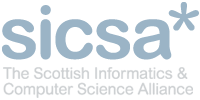by Dr Stefano De Paoli
4 February 2019
It is quite impossible to talk about European Research without mentioning the current political context as this has clearly created a shadow of uncertainty over UK based organisations’ role in future consortia. I must admit that my trip to the ICT2018 in Vienna (https://ec.europa.eu/digital-single-market/en/events/ict-2018-imagine-digital-connect-europe) did not start under the best auspices. The week before my trip, I learned that a group of colleagues with whom I have been working with for several years and with whom I am currently involved in an H2020 project, were planning to write a new project. During a chat over Skype they told me that they were not likely to include our organisation in the new consortium because they perceived some risks for their project with our participation….. this more or less gives an idea about the kind of challenges we are up against at this moment in time.
Thanks to the excellent support of the SICSA PEER scheme, I travelled to Vienna to the ICT2018 event from 4-6 December 2018. For those who may be less familiar with the process, every year in fall there is a main ICT event for European Research, which is organised in the country hosting the presidency of the Union. Often these events are called the Proposers’ Day as they are organised for people who propose projects and there are opportunities for networking and creation of partnerships. This year the event was an “ICT” event, meaning that there was also a showcase of current ICT funded projects. I have been attending these events for a few years now (the first time in 2012) and have always found them very fruitful in terms of networking and scouting for project opportunities and collaborations, especially for early careers and young researchers, who have limited international networking opportunties these events can be an entry door into the ICT European research. In particular, there is the opportunity to book in advance of the event a number of bilateral meetings (called Face2Face, or Brokerage event https://ict2018.b2match.io/ )which is essentially a sort of speed dating mechanisms with perspective partners. Meetings are booked via an online system in advance of the event and then ahead of the meeting once the schedule of the appointments and the times is received. Prior to commencing my travel I had secured 20 meetings. As I do not coordinate projects, I always try to book a number of appointments with organisations that I know may be coordinators, in the expectations that they could see our research offering as a potential contribution for their future projects. It must also be said that several of these meetings are often just speculative and do not lead to results, but it is also often possible to leave the event with opportunities to participate in multiple project submissions. I also use the F2F to enlarge my UK based network and always tend to book some appointments with UK based organisation in order to explore also national avenues for research (this year for example I met a consultant for the NHS and researchers from Manchester and Cardiff).
This event is an opportunity to meet people with whom one may be already be planning to write joint projects. This, in particular is something that helps refreshing existing trust relations, leading to increased commitments for projects. While I cannot reveal who I met and what are the details of the discussions that I had, I can say that I already have a few Skype meetings planned for the beginning of 2019 to explore potential collaborations, with organisations from Austria and Spain. Moreover, I received confirmation that planned project writing is likely to go ahead for March.
From many of the discussions that I had, I am confident that European organisations continue to want to collaborate with organisations in the UK and in Scotland especially and I felt very encouraged that very few people mentioned Brexit to me. I hope that this kind of enthusiasm toward our work remains intact and that collaborations can continue to prosper in the future. However, I think the best intelligence that I can share is to tell how much the PEER support from SICSA is important for furthering our own work in Europe. Knowing that we can rely financial on support for attending events like the ICT2018, makes an important difference. It certainly made an important difference for me.








 Only a few weeks till the deadline for outline applications to the
Only a few weeks till the deadline for outline applications to the 

